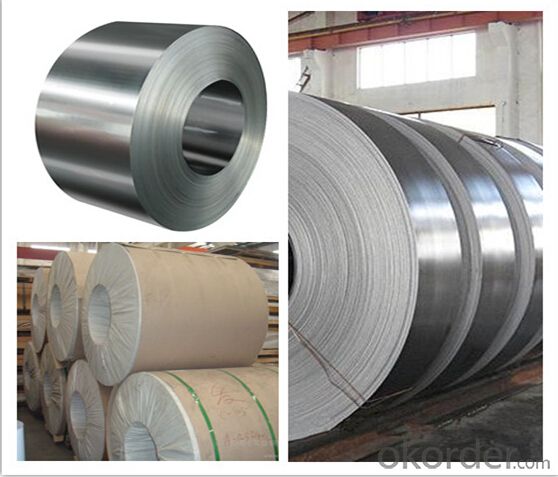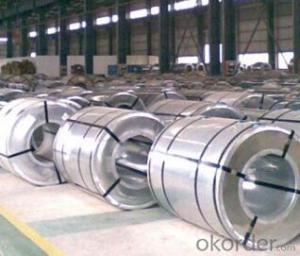Galvanized Steel Coil for Roofing Sheet and Color Base Materials
- Loading Port:
- Tianjin
- Payment Terms:
- TT OR LC
- Min Order Qty:
- 25 m.t.
- Supply Capability:
- 10000 m.t./month
OKorder Service Pledge
OKorder Financial Service
You Might Also Like
Description:
Surface Treatment:Galvanized
Technique:Hot Rolled
Standard:JIS, GB, ASTM
Steel Grade:Dx51d+Z, SGCC
Thickness:0.18-7.5mm
Width:914-1500mm
Export Markets:Global
Additional Info.
Trademark:liwei
Packing:Standard Export Packing
Standard:0.18-7.5mm
Origin:Tianjin, China
Production Capacity:5000mts Per Month
Product Description
Galvanized steel coil
Thickness: 0.18-7.5mm
Width: 914-1500mm
Coil ID: 508mm-610mm
Coil weight: From 2-10MT, according to the customer's request
Zinc coating weight: 60G/M2-275G/M2, double side
Spangle: Regular spangle, minimized spangle and zero spangle
Usage:
1. Construction and building: Roofing; Ventilating duct; Handrail; Partition panel, etc.
2. Further processing: Coating base plate.
3. Electric appliance: Refrigerator; Washing machine; Recorder; Microwave, etc.

FAQ
1.What's your MOQ?
25MT, it is for one container.
2.Do you have QC teams?
Yeah, sure, our QC team is very important, they will keep the quality control for our products.
3. What's your normal delivery time?
Our delivery time about 10-20days for standard sizes, if you have other requirements like hardness and width ,it is about 20-40days. But don't worry ,we also try our best for the delivery time ,because time longer and our cost is higher.
4.Are the products tested before shipping?
Yes, all of our PPGI and GI was qualified before shipping. We test every batch every day.
- Q:What is the role of steel coils in the manufacturing of pipes and tubes?
- Steel coils play a critical role in the manufacturing of pipes and tubes. They are the primary raw material used to produce these products. Steel coils are made by processing molten steel through a series of rolling mills, which shape the steel into flat, thin sheets. These sheets are then wound into coils for easy transportation and storage. In the manufacturing process of pipes and tubes, steel coils are unwound, and the flat sheets are passed through a series of machines and processes. The first step is usually to cut the steel sheets into the desired width and length. This is followed by forming the sheets into a cylindrical shape through a process called roll forming or continuous forming. The edges of the sheet are welded together to create a continuous pipe or tube. Steel coils provide several advantages in the manufacturing process. Firstly, they offer consistent and reliable quality. The production of coils ensures uniform thickness and strength throughout the entire length of the sheet, which translates to consistent properties in the final pipes and tubes. This is particularly important for applications that require high structural integrity and reliability. Secondly, steel coils allow for efficient production. The continuous supply of coils ensures a steady flow of raw material, reducing downtime and improving productivity. Coils also enable automated processes, such as roll forming, which can be highly efficient and cost-effective. Furthermore, steel coils offer flexibility in terms of size and dimensions. Coils can be produced in various widths and thicknesses, allowing manufacturers to customize the size and specifications of the pipes and tubes according to their specific requirements. This flexibility enables the production of pipes and tubes for a wide range of applications, from plumbing and construction to oil and gas pipelines. In conclusion, steel coils are the essential raw material in the manufacturing of pipes and tubes. They provide consistent quality, enable efficient production, and offer flexibility in size and dimensions. Without steel coils, the production of pipes and tubes would be significantly more challenging and less efficient.
- Q:What are the common applications of stainless steel coils?
- Stainless steel coils have numerous applications in various industries due to their exceptional corrosion resistance, durability, and versatility. Some common applications include manufacturing of kitchen appliances, automotive parts, construction materials, medical instruments, chemical processing equipment, and electrical components. Additionally, stainless steel coils are widely used in the production of pipes, tubes, and fittings for various sectors such as oil and gas, food processing, pharmaceuticals, and water treatment.
- Q:I want to get a new knife but i cant decide if i wan a spyderco pacific salt or a cold steel ak47
- Hibben are even better in my opinion, but cold steel are reputable and do good quality high carbon steel knives and swords. Paul Chen does some knives and they are the best I've seen but a lot more expensive
- Q:How are steel coils used in the production of industrial storage tanks?
- Industrial storage tanks commonly utilize steel coils due to their superior strength and durability. These coils are typically crafted from high-quality steel that is rolled into a coil shape, enabling convenient transportation and handling. During the production process, steel coils are initially uncoiled and flattened to create steel sheets. These sheets are then cut and formed into the desired shape and size for the storage tank. The steel sheets are joined together through welding or bolting to construct the tank's body, which is designed to endure high pressure and heavy loads. The utilization of steel coils in the production of industrial storage tanks offers numerous benefits. Firstly, the strength and durability of steel ensure that the tanks can withstand harsh conditions and resist corrosion. This is particularly vital for storage tanks containing corrosive substances or exposed to severe environments. Moreover, the flexibility of steel coils permits customization of the tank's design and size. This is especially advantageous in industries with varying storage requirements, like the oil and gas sector. Steel coils can be effortlessly cut and molded into diverse shapes and sizes, facilitating the creation of storage tanks tailored to specific storage needs. Furthermore, steel coils are easily transportable and storable, making them a cost-effective choice for industrial storage tank production. The coils can be efficiently transported to the manufacturing facility, reducing transportation costs and logistical complexities. In conclusion, steel coils play a crucial role in the production of industrial storage tanks by providing strength, durability, and customization options. Their usage guarantees the safe storage and protection of various substances, rendering them indispensable in a wide range of industries.
- Q:How do steel coils contribute to the manufacturing of household appliances?
- Steel coils contribute to the manufacturing of household appliances by providing a durable and versatile material for various components. These coils are used to create the outer casings, frames, and structural parts of appliances like refrigerators, washing machines, and dishwashers. The strength and flexibility of steel coils ensure the longevity and stability of these appliances, while also enabling manufacturers to create sleek and attractive designs.
- Q:case hardening steel is adviced or thru hardening steel is most suitable?
- I don't know your application, but here is some advice. Case hard provides a hard shell around soft steel, depending on the bake, the case is usually .002-.008 thick. (thousands of an inch) Heat treated steel or tool steel is hard all the way thru. Case hardening, provides toughness with flexibility, however, once it's compromised, the part is scrap. Hardend tool steel is extreemly hard throughout and the harder it is, the more brittle it becomes. The application of the part will help you to determine the material needed. For instance; Plastic injection molds are very hard so the hot plastic wont erode them over years of use. Punch Press dies aren't as hard but are tougher to withstand the shock. Machine bolts are case hardened so they can last, but soft enough to allow some stretching during tightening. Either way, the time in mfg will be about the same. Most tool steels today cut like cheese, but take time to be heat treated. Tool steel will cost a bit more than low carbon steel. Low carbon steel is as machinable, and cheaper, but, again, the baking period is as long or longer than tool steel. There are a lot of materials on the market today that maintain the durability of heatreated steel without having to go thru that process. 4140, ( or chrome/moly) comes to mind. There are also some 400 series stainless that work as well, and others. You need to determine strength, flexibility, ease of mfg, cost and repairability when considering which steel to use.
- Q:How are steel coils used in the manufacturing of shock absorbers?
- Steel coils are used in the manufacturing of shock absorbers primarily as a spring component. These coils provide the required strength and flexibility to absorb and dampen the impact and vibrations experienced by the vehicle. When compressed or expanded, the steel coils store and release energy, ensuring a smoother and more controlled ride for the driver and passengers.
- Q:On a fixie frame what should i get an aluminum frame or a steel frame
- This Site Might Help You. RE: steel or aluminum on fixie? On a fixie frame what should i get an aluminum frame or a steel frame
- Q:What are the dimensions of steel coils used in the metalworking tool industry?
- The dimensions of steel coils used in the metalworking tool industry can vary depending on the specific application and requirements of the tool being used. However, there are some common dimensions that are often seen in the industry. Typically, steel coils used in metalworking tools are available in various widths ranging from 24 inches to 72 inches. The thickness of the coils can vary as well, with common thicknesses ranging from 0.020 inches to 0.250 inches. The length of the coils can vary significantly, with standard lengths typically ranging from 100 feet to 2000 feet or more. These dimensions are chosen based on factors such as the type of metal being worked, the specific tool being used, and the desired outcome of the metalworking process. Additionally, other factors such as the weight and handling capabilities of the tool and the efficiency of the manufacturing process may also influence the dimensions of the steel coils used. It is crucial to consult with manufacturers, suppliers, or industry experts to determine the most suitable dimensions for steel coils in the metalworking tool industry, as these dimensions can vary based on specific needs and preferences.
- Q:What is stainless steel 316, and what are its properties and uses?
- if you want to know details, try looking it up in wikipedia. It's not a reliable source for everything, but truly technical stuff is good. It lists the exact range of elements, heats, and other things, as well as uses and things it shouldn't be used for.
1. Manufacturer Overview |
|
|---|---|
| Location | |
| Year Established | |
| Annual Output Value | |
| Main Markets | |
| Company Certifications | |
2. Manufacturer Certificates |
|
|---|---|
| a) Certification Name | |
| Range | |
| Reference | |
| Validity Period | |
3. Manufacturer Capability |
|
|---|---|
| a)Trade Capacity | |
| Nearest Port | |
| Export Percentage | |
| No.of Employees in Trade Department | |
| Language Spoken: | |
| b)Factory Information | |
| Factory Size: | |
| No. of Production Lines | |
| Contract Manufacturing | |
| Product Price Range | |
Send your message to us
Galvanized Steel Coil for Roofing Sheet and Color Base Materials
- Loading Port:
- Tianjin
- Payment Terms:
- TT OR LC
- Min Order Qty:
- 25 m.t.
- Supply Capability:
- 10000 m.t./month
OKorder Service Pledge
OKorder Financial Service
Similar products
New products
Hot products
Hot Searches
Related keywords



























